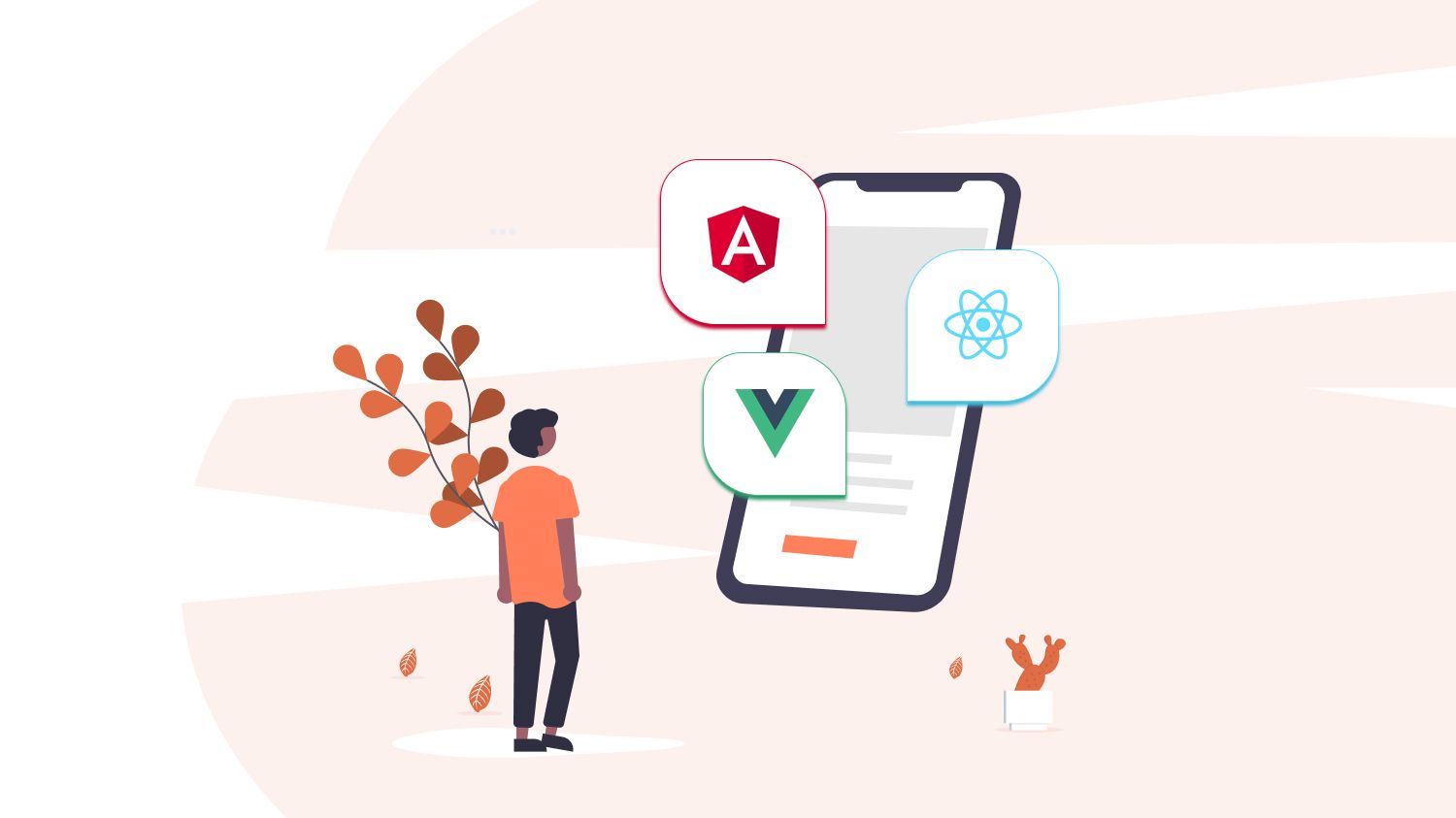What exactly are frameworks like Angular, React.js, and Vue.js? What are they used for? Who would need them, and when? I mean, a chef can go his whole life without coming across React.js and Angular. But that doesn’t mean it’s limited only to professionals in the complex world of computers and coding. Right?
Say you’re a business owner looking to take your business up a notch by creating a mobile application or a website.
You have zero experience with programming languages and code, and all you know is what you want your end product to look like.
This is okay, as long as you know what your exact requirements and expectations from the final product are because you can use this information to make an informed choice about which framework will help you achieve your goals in the most value-effective way.
This means the time for you to learn about the framework that is the best fit for your application development project is here.
Or maybe you’re a computer science student ready to specialise in one programming language or the other, and you don’t know which one to choose: Angular, formerly Angular.js, React.js, or Vue.js.
Your choice would depend on what sort of value you wish to bring to your team as a programmer. And now, you need to understand the main similarities and differences between these three popular frameworks to make an informed choice about your career path.
What is a Framework for Web Application Development?

A framework is an outline of the application that you wish to build. You can see it as a template that can be modified or tweaked according to the final application you want.
Basically, frameworks make your life easier as you won’t have to build the application from scratch.
Read on to determine whether you should invest your time and money in Angular, React.js, or Vue.js while considering your web application project frameworks.
Which is Best for Your Application Development Project: Angular, React.js, or Vue.js?

There is no straightforward answer to this question. It’s like asking which cultural language is best as a second language for your child: German, Chinese, or Spanish? Several variables need to be considered before you can pick the best language, or rather, the most appropriate language for your child to learn. Which ones are available in his or her particular school? Which one does he or she seem to have an affinity for? Not to mention your geographical situation.
Why teach your child Chinese over Spanish if your family is settled in Honduras for the foreseeable future? The same logic can be applied when you’re trying to figure out whether you want to use Angular, React.js, or Vue.js for your app development project.
You need to understand each framework’s strengths and weaknesses before seeing which one aligns well with your project goals.
Also Read: Vue vs React – The CTOs Guide to Choosing the Right Framework.
Who came First, the Chicken or the Egg?
Angular, a brainchild of Google and a front-end development software, came first and made many changes over the years to make it the feature-rich version today.
React.js came next, from the house of Facebook and Instagram, and took the developing world by storm with its ease of usage.
Vue.js has only been around for a few years but is already vying for attention with the big guns. Developed by Evan You, a former Google employee, Vue.js took shape when Mr You decided to build a framework that was similar to Angular in functionality but less complex and easier to use.
Comparison of JavaScript Frameworks
Angular uses TypeScript, which is a superset of Javascript, an entirely different programming language. TypeScript comes with advanced refactoring capabilities and can provide you with some distinct advantages such as autocompletion and navigation.
The drawback here is that you cannot start using Angular straight away if you do not have a team of well-versed developers in TypeScript, which is no mean feat. It takes time and effort to learn TypeScript.
React, which uses its syntax called JSX-, is simpler and faster to work with and does not require intensive JavaScript knowledge. The documentation of React, however, is lacking when compared to Angular and Vue, both of which have helped developers learn better over the years with concise and useful documentation.
And then, we have Vue, which works with a template-based syntax and blows both Angular and React out of the water with its simplicity and ease of usage. Another advantage of using Vue is that codes generated using the Vue framework can be integrated into an HTML file quite easily without any external conversions.
Which Framework Grows Best to Accommodate Your Growth?

Scalability is an integral part of the scope of most projects. It merely means that as a project grows following rising demands, the application you create must also keep up augmented functionality. It is essential to choose a framework keeping your scalability needs of the future in mind for an optimal choice.
Angular and React are clear winners here, with Angular providing modular development structure and React offering a component-based approach with reusable components.
Vue is yet to catch up in the scalability aspect, as it uses a template-based syntax, which can be a problem when it comes to large projects that require new templates.
Learn How to Scale Your Startup & 4 Important Tips to Grow Your Business.
What Are the Common Technologies Used?
Angular, React, and Vue is used to build Progressive Web Apps (PWAs) and have many templates and pre-created applications available that you can start working with.
However, if you are looking for more options to choose from when it comes to templates, Angular and React would better bet as they have more readily available templates than Vue, perhaps on account of them having been around much longer than Vue.
Here, take a look at the 30 Best Progressive Web Apps in 2022.
What About Framework Sizes?
Framework size is an important parameter to consider while picking the right framework for your project as your user interface’s performance will directly affect your product value, and choosing the wrong framework for your project can affect the performance inversely.
These are the framework sizes for Angular, React, and Vue, in decreasing order of weight.
-
-
- Angular – around 143K
- React.js – around 43K
- Vue.js – a mere 23K (easily making it the lightest framework of the three.)
-
A Word From the Horse’s Mouth
A survey conducted in 2017 revealed that most professionals prefer working with React. A contributing factor might be that it comes directly from Facebook and enjoys global popularity, but React is also cost-effective and time-efficient for projects with tight deadlines.
The community of developers working closely with React and adding to its library exceeds over 30,000, which is a significant number in the field.
And while Angular has managed to retain more followers with its initial version and did not fare quite well with the newer version, it still has a respectable following who are working actively to contribute to the Angular community.
On the other hand, Vue is a different story and is still finding its foothold in the community in terms of popularity.
In Conclusion: What’s the Verdict?
So, we come back full circle to the same question: Angular, React.js, or Vue.js? Which is the best development framework for your project?
Here’s when you should use Angular for a large and complex project. If you have a team of developers who are proficient in Angular or you have the time to train your team to learn TypeScript before the commencement of your project. This will give you a platform that is easy to use and reliable for improving your application’s performance efficiency, not to mention the scalability factor, which is also a big plus.
Now, for React.js. React.js is ideal for building or optimising an application whose front-end is less complicated, but you still need to ensure excellent performance and leave room for scalability. Not to mention how fast you can develop applications with the React framework, so if you’re working towards a stringent deadline, React.js is the way to go! But, keep in mind that you don’t mind the reusable components.
Finally, the latest player in the field, Vue.js. Consider Vue.js when you have a small project in hand with limited scope. Despite the size of the project, Vue.js will still ensure that at the end of the day, you will have a great app that promises high performance. It is also essential that you have experienced team members who have a good understanding of JavaScript.
We hope we have helped! Check out more of our content resources to stay ahead of the game.





